I am German – Juandalynn Abernathy
Many thanks to Claudine for translating this interview into English language.
If you want to read the interview in German language, please click here.
I had the honor to interview Juandalynn R. Abernathy in her hometown of Balingen in summer 2021. Juandalynn Abernathy is Dr. Ralph Abernathy’s daughter, who – together with Dr. Martin Luther King Jr. – started the civil rights movement in the United States. She is also Martin Luther King’s goddaughter.
M.W.: Mrs. Abernathy, who are you?
Abernathy: I am Juandalynn R. Abernathy, born in Montgomery (Alabama), raised in Atlanta (Georgia). I’m the second child of Dr. Ralph David and Juanita Jones Abernathy. I was born on November 30th in 1954. The firstborn sadly died in August the year before, shortly after birth. I have a sister and two brothers, who all live in the USA. My father was a priest of the First Baptist Church in Montgomery, Alabama. He and his best friend and companion Dr. Martin Luther King Jr. were the founders of the Civil Rights Movement in the USA. After the assassination of Dr. Martin Luther King Jr., my father became his successor.
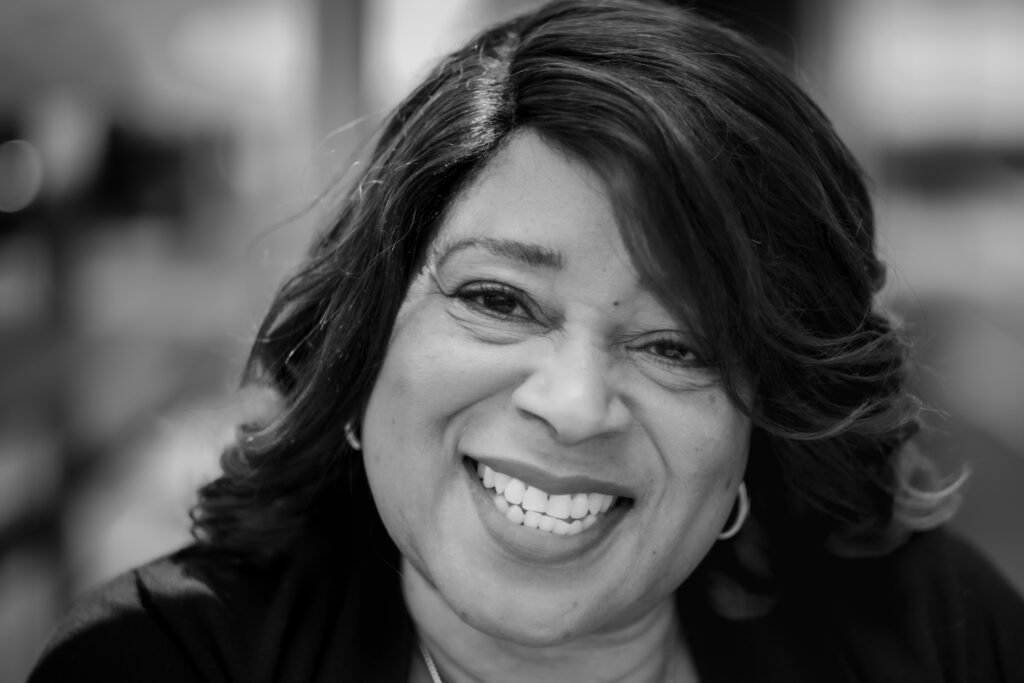
I went to elementary school in Atlanta (Georgia), a school for white people, where me and my siblings were integrated. After that I went to Northside High School in Atlanta and received a scholarship to get a Bachelor’s degree at Oberlin college. Later on I received the Master of Music in Boston. As a child and teen I already sang in front of an audience and gave concerts in church.
With a scholarship from the Goethe-Institute in Germany, I successfully graduated from college in 1980. Since then I’m living in Germany with my family. I married in 1996 and have an adult son.
M.W.: What made you choose to answer my questions and contribute to my project?
Abernathy: Your project concerns racism. As the daughter of a civil rights activist, I’m interested in everything that covers skin color or nationalities. Above all, I already live in Germany for so long. I know Germany since 1980 and discovered positive as well as negative developments. It’s just great, when racism gets addressed. That’s why your project is so interesting to me.
M.W.: Thank you. Mrs. Abernathy, you came to Germany out of professional reasons. What made you stay?
Abernathy: I thought Germany was just beautiful and very interesting – so different to the US. After my studies in Boston, I moved to Manhattan, where I did some auditions and worked for a company that gave scholarships to students in need. That was a beautiful job, but I was not professionally trained to do it. Life in New York was very hectic and impersonal. It’s beautiful there and fascinating, but if you don’t have a lot of money, life is hard. I thought to myself: that can’t be it.
I received my scholarship from the Goethe-Institute in Atlanta and that’s how I came to Munich. I loved it there, a totally different culture and I just wanted to explore it all – wanted to get to know Europe. Of course I’ve been to Europe before, but to live here and to see how things work is different. At the Goethe-Institute you can find a lot of people from different nations, who all are very open minded and it was easy to find new friends. I once was invited to Italy. I really liked that a lot as well. Especially because one of my girlfriends lived a block away from Luciano Pavarotti in Modena. I learned a lot about the Italian culture and found it fascinating.
During my studies, my vocal teacher in New York, Joan Caplan, already mentioned that Germany would be a country for me, as there are theatres in every city and it would be a stepping stone for young singers. She also said: “If you go to Constance, you’re still in Germany, but it’s also near to Zurich.” I liked that.
My father also said: “You are young and single, take that chance.” So I got back to New York, cancelled my apartment and came to Germany in 1981 for good.
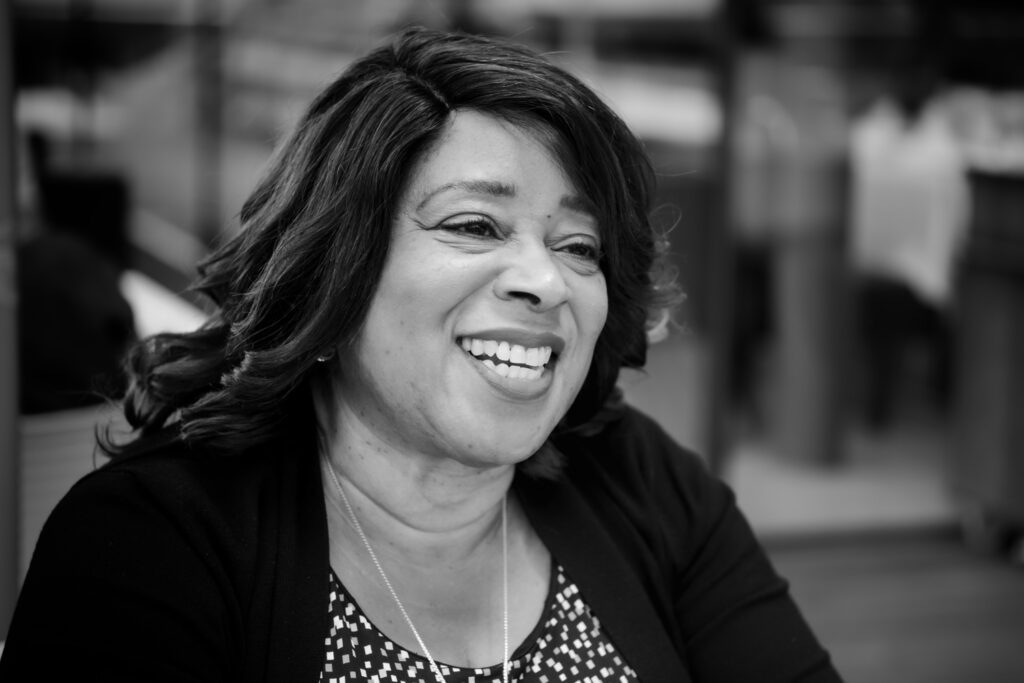
M.W.: Do you ever wish to go back to the States?
Abernathy: Yes, sometimes I think about it. But my son studies on the University of Frankfurt and I cannot leave him. I live in Germany for so many years already, longer than I ever lived in America. Yes, America is my home, but Germany is too.
M.W.: In my interview with Sawsan Chebli, she said: “The midth (in terms of racism) is too silent in my opinion.” Would you agree, as a daughter of a civil rights activist and goddaughter of Martin Luther King?
Abernathy: Yes, very silent. I feel like people don’t really want the necessary change. They don’t feel addressed, don’t want to talk about the topic, don’t want to get involved. It was always like that, at least in Germany. I also think this silence got even worse than before.
M.W.: Why do you think that is?
Abernathy: (thinks about it for a longer time) I feel that way since the fall of the Berlin wall – a big change happened then. But this fall needed to happen. I always told my friends: “Germany cannot be separated forever, it has to reunite.”. A lot of them were sceptic and said that there are too many differences in both parts of the country. The problem, in my eyes, is that the western part has evolved in the last years, but the East has not, it stands still.
I will never forget: back in the days my father was the President of the SCLC (Southern Christian Leadership Conference). The government of the former German Democratic Republic (GDR) invited us for a vacation (Editor’s note: aegis of the peace council of the GDR). We’ve been to Leipzig, Dresden and a lot of other different cities. Sometimes we just walked the streets. People had pillows on their windowsills to lean on and watch the streets of their neighborhood. Then they saw us and called out: “Look, Neger! Neger!”. We didn’t even know the word back then! Our interpreter back then told us, that it’s not the N*-Word, but more the counterpart to Negro. I did not feel comfortable there anymore after that incident.
After this experience and my impression of the mentality of the people in eastern Germany, I was convinced that this way of thinking will spread after the fall of the wall. The racist people in the West were subject to the fear to show their real feelings. But together with the state of mind of the East, people will form groups and support their racist paradigm. We do know from our society, that evil will always be faster spread than the good.
The western part of Germany surely needed time to learn. People in the eastern part got stuck and were forced to suddenly think like the west. They did not share that mentality back then. But people do need time to learn.
The current topic with migration has always been there in history. It’s been immigrant workers, that were tolerated, because they helped to rebuild Germany. And now we have refugees …
M.W.: … who turn up to get a slice of the cake.
Abernathy: Exactly. But the slice of cake is already gone. You shouldn’t say that out loud, but Germany was rich in the 80s, really rich. And then people from the East came to eat from the plate, that the West paid for. But that is Germany as well and you have to except that.
Getting back to the refugees: They have a different skin tone and maybe also a different religion and that does not fit to us (Germans). I can say that, because I have a german husband. I sometime hear him saying that and it bugs me. But this kind of thinking spreads. Also that refugees are lazy and just come to prey on our social system. Above all, we also do have political parties now, which did not exist before.
In earlier days, people were afraid to use the N*-Word, today it’s different. I heard something, that really hurt me. It’s the word “Lenor”.
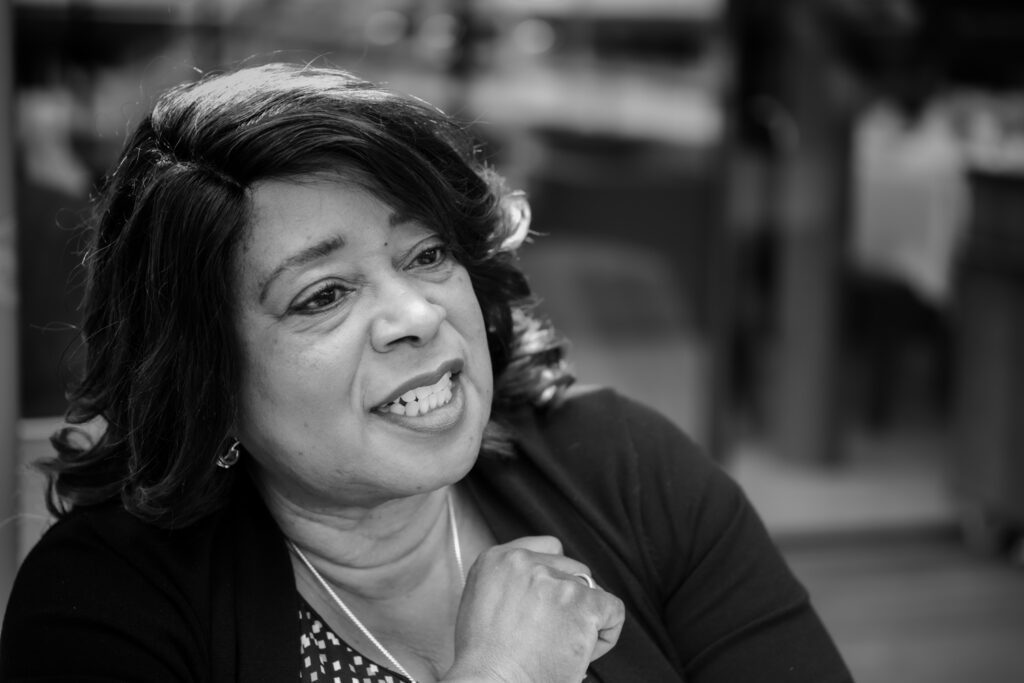
M.W.: … like the detergent?
Abernathy: Exactly. Just with a different meaning. It means Leibeigener Neger ohne Rechte (Negro Bondsman without rights).
M.W.: (pauses) Ok… that’s heavy.
Abernathy: I thinks it’s totally reprehensible. As well as the term “BIO-Deutscher”. Words and statements like that are the thermometer of our society.
M.W.: Where do you think that comes from?
Abernathy: It’s plain fear of having to share their cake.
M.W.: What’s it like in the USA? The cultural diversity is different to Germany.
Abernathy: Yes, it’s different in the USA. The “White Man” still has the saying.
M.W.: You’ve been there, in 1963, when your godfather Martin Luther King Jr. held his famous speech at the Washington Memorial…
Abernathy: Washington. Yes, sure!
M.W.: Did Martin Luther King Jr. dream come true?
Abernathy: Surely not completely. No. On our last Christmas together with my father, in 1989 in Constance, we had a discussion. He said: “You know, Juandalynn, time is turning backwards again. We go back to the old days.”
I asked him, why he felt like that. He answered: “Black people in America think they are free, just because they can buy that car, that apartment or a house or are eligible to study on universities. But time turns back, because mankind forgot too fast, that we are just a few generations away from slavery. People forgot too fast, what has been.”
His reason for that was: “The jewish people don’t let us forget what has been and what has happened to them. Jewish kids grow up learning their history. It’s on repeat. It’s not that way with black people in America.”
After that I though my father was right. You can see that on the black President Obama.
But Obama is not black. People forget that. He has dark skin but grew up in a white world. He did not go to black schools. He did not grow up in a black community. His mother was white, his father from Africa. But he never knew his father, as he has never been to Africa. He grew up with his mother and later on with his indonesian stepfather in Indonesia. He later came back to America and lived in a white society.
Obama explains himself “being black” with his wife Michelle. She grew up in a black society, as her parents are both black. Of course we’ve been happy, when he became President, but my late brother said that time “It’s good he became President, but things will get worse from now on.”. And that did happen. The presidency of Obama only explains the beginning of all problems which always existed: the Republican party never did and will never like Obama and actively worked against his success.
And that was all because of his skin color and not because what a man can do for his country. He tried to bring America back together and nevertheless separated the country. The white politicians of the republican party systematically worked on separating the society.
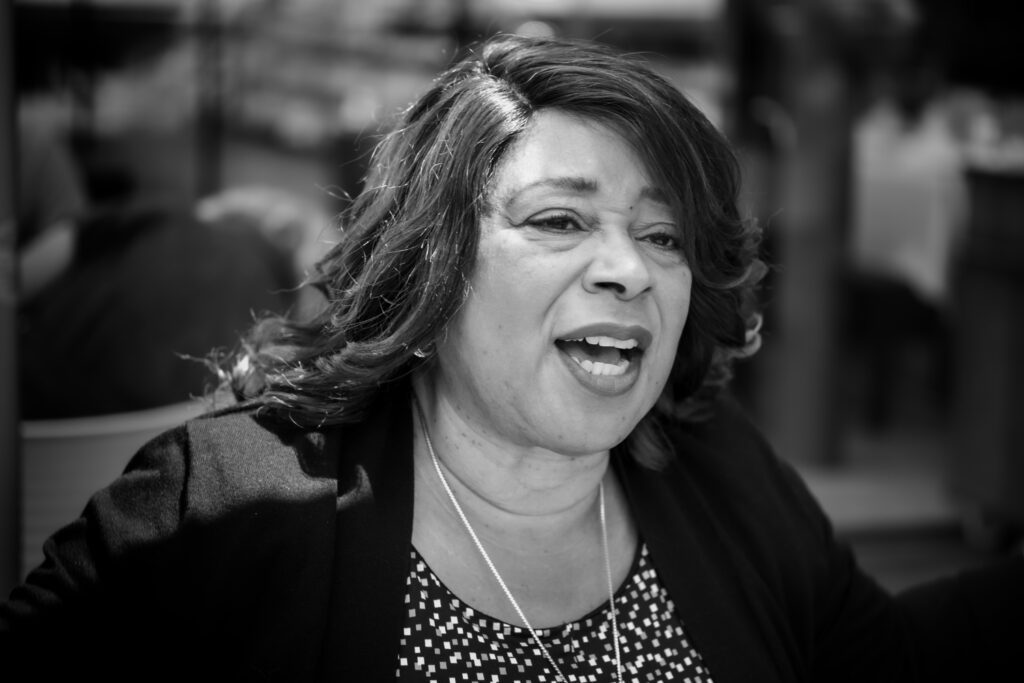
M.W.: So you mean Trump is the consequence of Obamas presidency?
Abernathy: Yes, exactly. Obama had to clean up first, what Bush had left. And he, of course, (Obama) whipped the country back into shape, not Trump. Trump inherited a blooming country after two terms of Obama. People unfortunately forgot that Obama took over a devastated country from Bush. Bush is a nice guy, but after his term, America was in ruins. So what did Trump make “great again”? America was great again after Obama.
But Trumps ideas are not just gone. The “white man” is scared of being a minority in about 10 years. They do not want to loose control over that. The attack of the United States Capitol could only happen as long as Trump was president.
M.W.: What would your father and MLK have said about Trump?
Abernathy: Both would have been appalled and would have fought him. Before my mother died (in 2019), she told me about her dream, in which “we” stood in her shoes. That “we” fought and demonstrated. She sat in a wheelchair and was wondering, that we were still fighting for her goals and why we haven’t gotten any further.
My father and Uncle Martin, they were fighters.
But how many people still fight today? A lot of people just think about themselves and about their money. I have to speak the truth now about the alleged freedom activists who still live today: they do have a lot of money by now.
M.W.: … so much, that they are fed up with fighting?
Abernathy: I don’t want to call out names, but first of all they watch their own wealth. We Abernathys have never been wealthy. Quite the contrary, we are very social.
M.W.: For me, both speeches of Martin Luther King Jr. and Amanda Gorman are our history’s moments of glory, don’t you think? In an interview with Oprah Winfrey Gorman told her, she wants to run for president in 2036. Do we witness a new generation in the USA right now?
Abernathy: Fantastic, yes. When young Americans hold on to “Black lives matter” and the fact that “we’re all equal”, and they further work on this movement, then I’m positive, I see a chance.
I have to be honest and tell you how it is: I cannot stand the current Republican party. They are racists. I just cannot put it any other way. They do not support the well-being of America. Their goal is to make themselves and the wealthy even richer. I can’t even say they work for the middle class. This class disappears more and more. If the Republicans go on doing that, they will separate the society even more.
In my opinion, it’s really hard to do, but we have to fight for being more social. But America doesn’t want that, because America is capitalist.
M.W.: I read between the lines before, that Obama was not so much accepted in the black community. How is it with Kamala Harris?
Abernathy: Yes, let’s talk about the difference between Kamala Harris and President Obama. Kamala Harris’ mother is from a very high caste in India, her father is from the Bahamas. People say she’s Asian. But the media calls her black. That’s very rare in America.
Obama’s mother though was White and a direct descendant of the Mayflower-movement (Source: Deutschlandfunk).
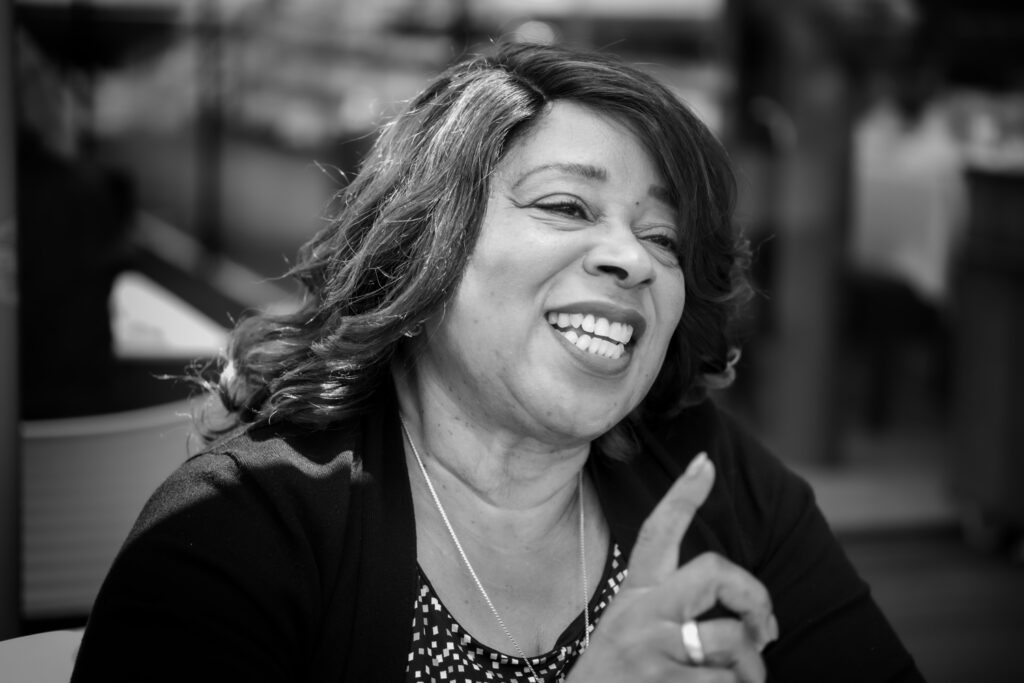
M.W.: That means Harris is more accepted in the black community than Obama?
Abernathy: Yes, so much more. She went to a black college and grew up around black people. She sees things different, because she’s from a black society. You cannot say that about President Obama. Going to school with black people was rare for him. It’s the same for my son and also for your wife. Both grew up in a white society. Sure, both do have the knowledge of “being black” and witnessed discrimination. But would both be able to exist in a black society in America?
M.W.: If Michelle Obama would run for the presidency, she surely would be accepted from the black community?
Abernathy: (long pause) That’ll never happen. Obama already said once: “One president in the family is enough.”
M.W.: But it would be her decision, not his.
Abernathy: Yes, that’s true. She would be a good president. She’s a very smart and articulate woman. I’m a fan of Michelle Obama. I think the American nation would definitely vote for her. But I don’t think she wants to run, as she would be the republican parties boogeyman and also I think this position would be too much for her.
M.W.: Here in Germany, there’s this culture of rehabilitation, e.g. in relation to the 3rd Reich or the Holocaust. I once read a quote from Joe Biden about the massacre in Tulsa 1921 in which he stated: “That’s what great nations do. They come to terms with their dark sides.” Do you think Biden and Harris are the right people to come to terms with the dark side?
Abernathy: To start it, yes. It was important, that Biden won. We cannot have Republicans rule the country. I hate to generalize, but republicans are racist. I would say, Trump risks democracy and it’s important he’s gone.
The only one who could have won in a world of white, conservative men, could have been a conservative. That’s why Biden won. All others – Bernie Sanders and everyone else – would not have won against Trump.
When the white man votes, he needs a conservative to vote for, and that was the face of Biden. Biden is a constant, he’s been a politician for very long and knows what he’s doing. That’s why he is important for America. Kamala Harris was a strategic decision. It’s been black women who voted for Kamala Harris. I don’t know if white women voted for her, I did not see that statistic.
My mom always said, and that’s true: “The white woman is still under the spell of their husbands. And he tells her to vote republican, if she still wants to stay home and don’t want to work.”
But black women had to and still have to be independent and strong. They voted for Kamala Harris. They actually are the minority.
I don’t know if Biden will run again. But it’s important for us having another Democrat in the second term.
M.W.: Not just for America, but for the world.
Abernathy: Exactly. Trump would harm the whole world, not just America and the democracy. I’m sure, off stage he was a joke to others. Do you understand? An egocentric, selfish narcissist, a sick man, he IS a sick man. I don’t want to compare him with Hitler, but he would have caused damage for the whole world. That’s why he had to be dropped. If he comes back – I cannot imagine that.
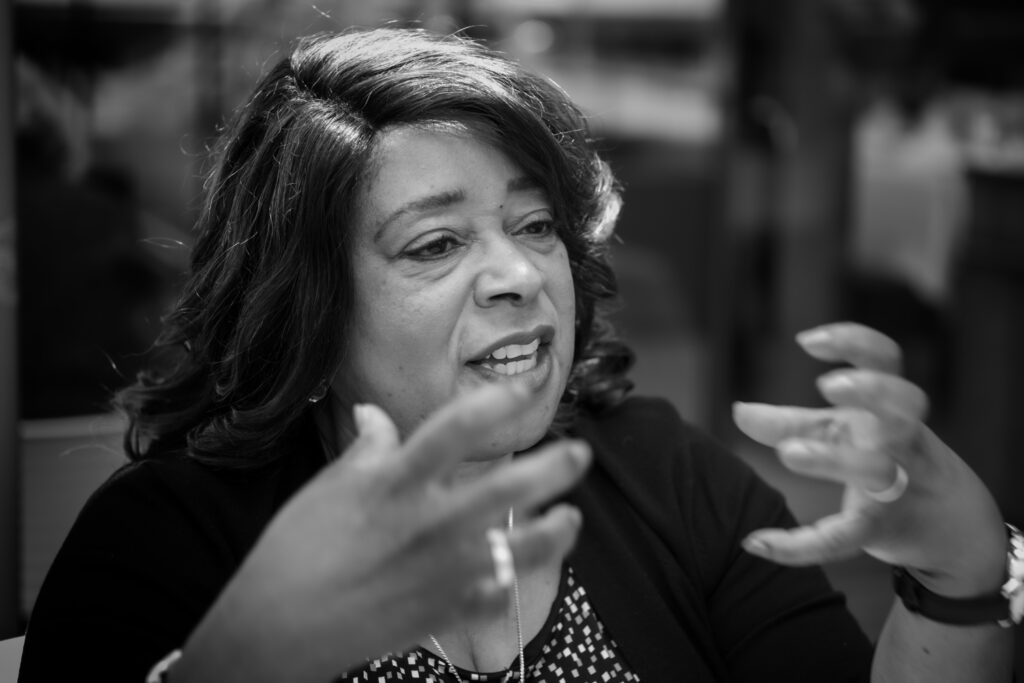
M.W.: I think we’ll live to see that. The next election will take place. I read the poem of Amanda Gorman in English as well as in German and was wondering about all the discussions about who would be predestinated to translate this poem to German language and who would not be. Can you relate with that discussion? Abernathy: I heard that Gorman said, she won’t let white people translate it. Is that correct?
M.W.: I’m not sure if that quote is from her. There was a white female author in the Netherlands who was supposed to translate it. But she wasn’t picked after all. In Germany it’s been three people. But I’m not sure who made that statement.
Abernathy: Ok, I don’t know that either, I just heard it. I know her poem. It was given to me as a present. I’m so thankful for it. Of course I read it, but out loud for myself. I’m so enthused about her.
Later on I learned, that my sister knows her. My sister is the principal at Gorman’s school. She’s always been enthused about her as well.
What I wanted to say: I read the poem in German. It wasn’t fully translated correctly. I found some parts in it where I thought “Oh, they didn’t get that right.” But maybe the words in German had to be that way, so they rhyme, I don’t know.
M.W.: Maybe it’s also hard to find the right words and to compare the languages.
Abernathy: Exactly. So I stopped reading it in German.
M.W.: I had it exactly the other way round. I had French in school as my first foreign language. For me it’s difficult to deeply understand the lyrics of a poem in English and to infer which meaning a word or sentence has. And I also did ask myself, if it isn’t a type of discrimination as well to say “This poem, which moves the world, is not supposed to be translated by white people.”
Abernathy: Oh, did Gorman say that?
M.W.: That’s what I heard. I just ask myself, why a white person should not be able to translate this poem. There are white Americans who do understand the ambiguity and the subtleness of black lyric.
Abernathy: Yes, for sure. But I don’t know the reasons why they decided like that. Maybe it was a requirement of the publishing company, because they wanted to have control over it.
Amanda Gorman is a highly intelligent and gifted woman. My god, I’m so stoked.
M.W.: Mrs. Abernathy, in the magazine „Schwarzwälder Bote“ I read that you with four other women founded a group to talk and hold readings about daily racism. But I couldn’t find any more info than this article. Could you tell me more about this group?
Abernathy: The group is called “Für Miteinander”. The head of this group is Annëlle Koschnike-Nguewo. She’s an engineer and works for the city of Balingen. She has African roots. A highly gifted young woman. She studied in Germany and received two master degrees. She’s married to a german man with whom she has three children.
In our group there are women from Africa, South America, Turkey and me as an African-American. We also welcome muslim women, but mainly we are Christians in this group. At „Für Miteinander zusammen Leben“, in English „to coexist“ it’s all about accepting each other, to reflect and to call out everyone’s attention to racism in Germany.
We organize church services in our city’s church, where I am a communal councilor for almost 15 years now. There we all get together and address the topic of everyday racism.
Mr. Wolfert, please give me a few minutes, to answer your questions.
The local protestant church said: “Ok, let’s do a service and an hour of prayer.” An hour of prayer? What can you do while praying? I mean, praying is nice and all, but we need actions. Now we have services during the day at noon. We had a few services now at the Stadtkirche (Balingens protestant church) – they all have been very nice, but during Covid, not many people came.
Like I said, we need actions. Together with Annëlle (Koschnike-Nguewo) from our group, we talked about my idea of having a musical with refugee kids. But for that, those kids need vocal training. I asked her: “Can those children afford vocal lessons?” No, of course they don’t.I teach at a music school in Hechingen and chaperon a talented young singer, Nathalie, at the conservatory in Stuttgart. So I’m at both schools a lot.
I see a lot of children there, who have russian-german roots or who have scholarships from Korea and China. But I never saw children with a different skin color, who were sponsored. I thought to myself – you just cannot tell me, that there is no talent in kids with migration background.
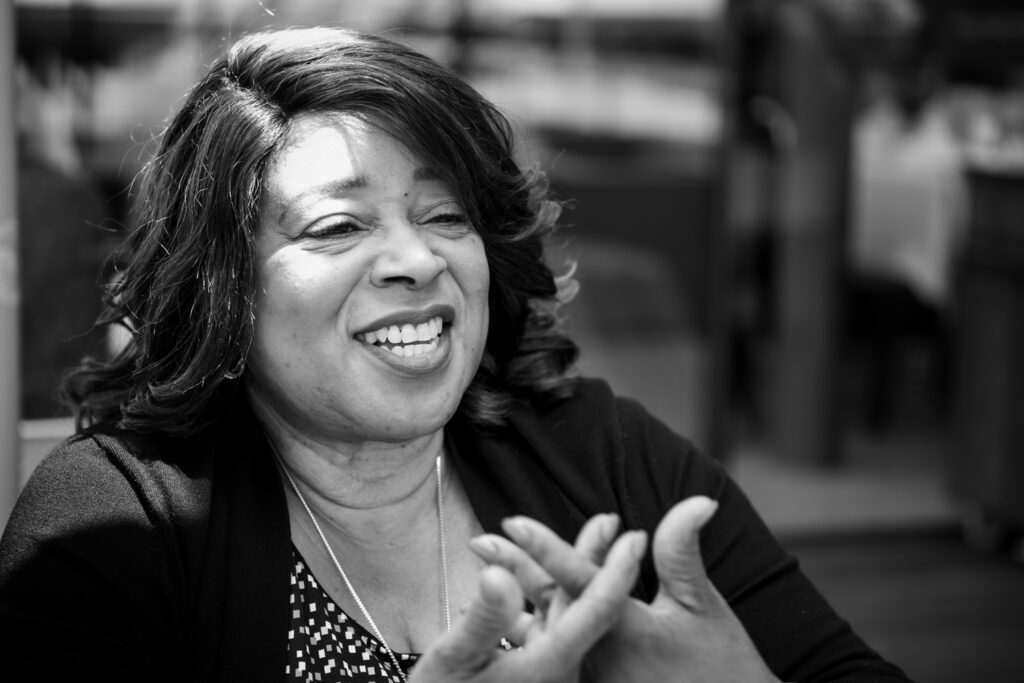
M.W.: … because their parents could not afford that school.
Abernathy: That doesn’t mean that not 1 or 2 families could afford it. I just thought it’s unfair. The system does not allow the “melting pot” from my point of view. Do you understand?
Where are the activities for those children? When I started my communal councilor in church there was this really great female pastor, who I always talked with about that topic: “We have to do something for the youth, they are the future! In my age, I’m already on the downgrade.”
(Pause) Mr. Wolfert, how old are you?
M.W.: I’m exactly 10 years younger than you are.
Abernathy: I thought so. The point is, our youth is the future. If we, and also the church, don’t invest in our youth, then we’re lost. That’s why I’m disappointed so often. Then I see how it really is. Always these half-baked actions. We need actions and activities for the young. I teach these young people and we talk with each other – I somehow have a good connection with them.
I also know young adults in their 30s who say “After I get married, I will leave church.” What’s church for then? Church is boring. Church is full of old people and the prayers do not represent the reality. Do you understand?
I hear that a lot. People sit there and listen, just because they think it’s their duty. But we have to win children and young adults over for church. Does the priest say anything that helps us or the young people in life until next Sunday? No! I know that.
I sit in our church council and know the numbers of people who leave church. Do you understand? They always say “Ah, that’s probably because of Covid.” And I’m sitting there, thinking “That has nothing to do with Covid. That’s the result of you not doing your job right.”
That’s exactly why I want to proceed with my project, my vision, with the musical for refugee- and immigrant-children. I want to make it big, not just in an airy-fairy way. My former manager introduced me to Evelin Nolle-Rieder from the K3 Kleinkunstbühne theatre in Winterlingen. Together with her and Annëlle (Koschnike-Nguewo) we talked about creating task groups and to invite children with migration background and german kids alike.
We all have to come together and through hearing and singing – not with any religious content – the musical should… (pauses) … Mr. Wolfert: what kind of music are children listening to at the moment?
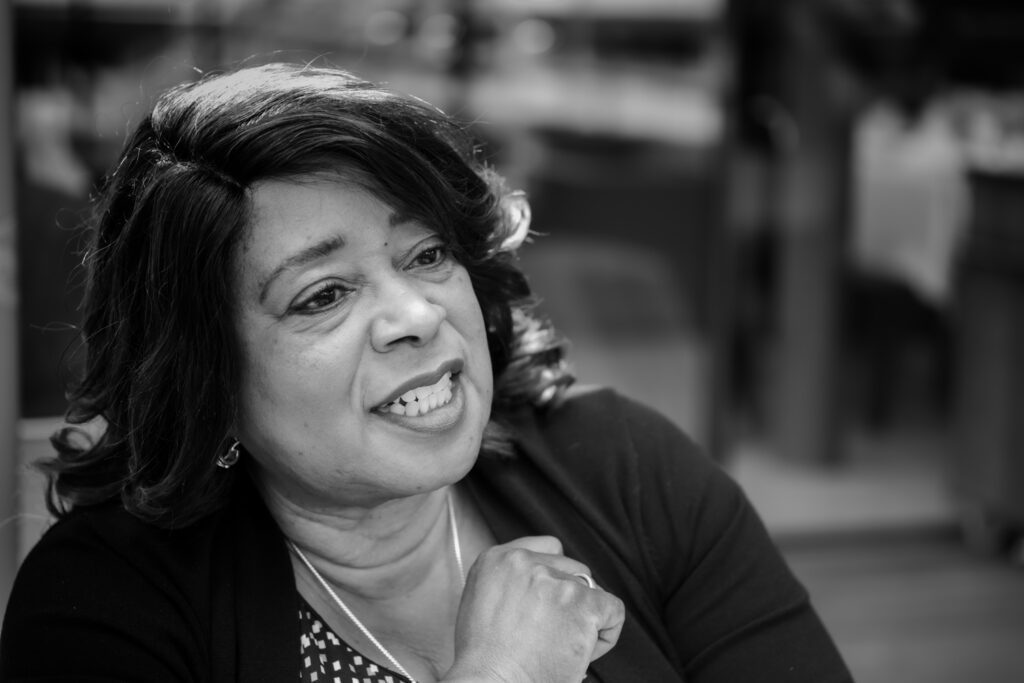
M.W.: „Normal“ music?
Abernathy: Exactly, Charts! Kids want to sing and come together. I later want every child to have had a positive experience here in Germany. We have to grab racism in an early age, because it starts in kindergarden and elementary school already.
For example, Annëlle (Koschnike-Nguewo) told me that a few weeks ago, in her son’s class, another boy called a girl “Brownie”. I think the girl was Indian. I don’t know the details, but I know she was called “Brownie”. So Annëlle’s son asked her „Don’t you mind?“ and she said “I do.”, he answered “Why don’t you say something?” and she said “It does not matter, if I say something.”
No one told the teacher. The girl just coped with it.
That reminded me of my story. I was called Bosko and Brownie as well. Every day in 5th, 6th and 7th grade.
How that hurt! Do you understand? Annëlle’s son later talked to his teacher about the topic and then racism was talked about in their school: “How would you feel, if you would go to school in India or Africa and someone would call you White, because you are the only one?”
M.W.: My wife sometimes calls me “White bread” just as a joke of course.
Abernathy: White bread, yes. The point is, that after that the children understood that calling someone Brownie is not ok. But teachers do not always address the topic and children sometimes don’t dare to say something. The point is: No one is born racist.
My son went to an outdoor-kindergarden. Some other kid talked about something my son did not understand, because he did not realize that I am black and his father is white. He was 3 years old back then. So he came home and said: “Mama, Evi said, she does not want to play with me anymore, because my skin is not white as snow.”
When I talked to the kindergarden teacher about it, she just said, this couldn’t be true. So I said “So, you’re saying my son is a liar?” “No, that’s not what I said, but it just can’t be.” “If my son says it happened, it did. So I want you to take care of it.”
The mother of this girl called me afterwards and apologized and said, she does not know where her girl got it from. So I replied: “She must have picked it up somewhere. The topic must have been talked about at home. No child would get the idea by itself, not to play with my son, because his skin does not look like snow.”
She said she’s so sorry. She did also talk about this problem in kindergarden, but the teacher refused to help, but just wanted it to be dropped.
And that’s a problem we have in Germany. People just want problems to be dropped. And that’s exactly why it’s so important to address the racism issue. Every 4th person has a migration background. The “old Germany” does not exist anymore. But we all are people and we all are equal. We have to teach this to our children. We have to start addressing this issue in kindergarden and schools, so that we learn to live together in harmony and to evolve as human beings. That’s my opinion and that’s why I do this musical.
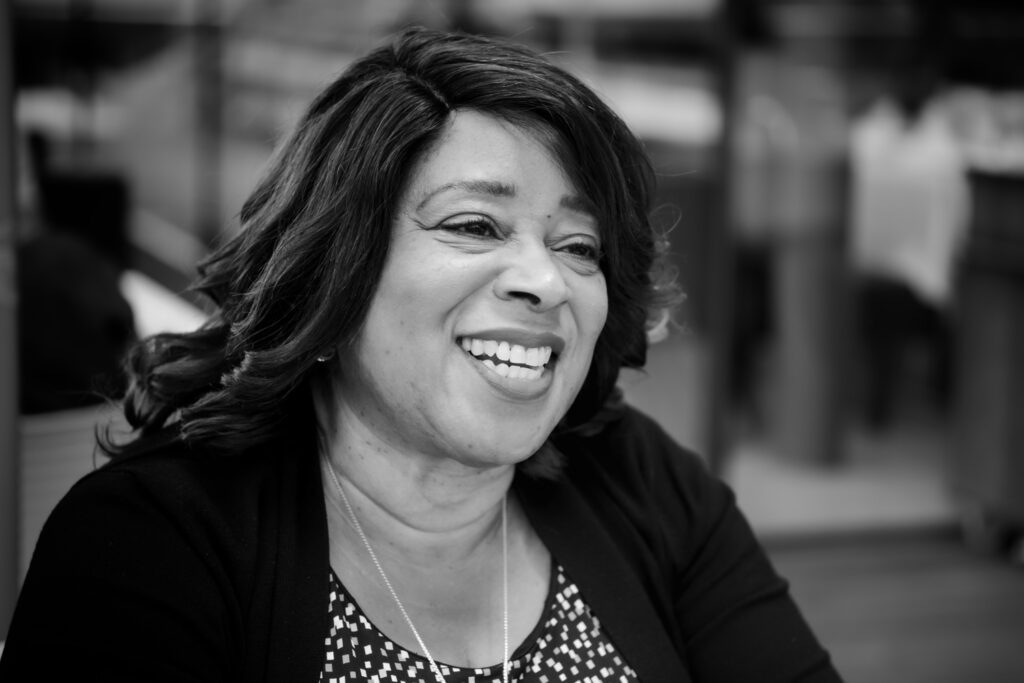
M.W.: Next to last question, which I always ask in my interviews: What’s “typically german” for you?
Abernathy: Typically german? I never thought about that. Do you mean food-wise? I cannot give you an answer to that.
M.W.: If you’d had one wish, what would you wish for?
Abernathy: Personally?
M.W.: Or in terms of racism…
Abernathy: (long pause) I would wish for prejudices that people have against other people being ceased, as I myself have been discriminated a lot. For a lot of people it’s normal that a black woman and a black man with the same education, get paid less for the same work. Or the prejudice that, as I come from America, my education is worth less. Although my education was acknowledged as equal.
There are so many factors. I experienced so much here. There are so many wishes I have (laughes). For me it’s important, and that’s why I stayed, I do see a positive chance for Germany. Maybe because we belong to Europe, to the EU. I just hope that people can eliminate their prejudices and fear in the next generation or the one after that. That’s what I hope for, otherwise I see some issues.
M.W.: Mrs. Abernathy, thank you so much for your time and this wonderful interview.
Abernathy: I hope I helped a little and that it was some sort of informative.
